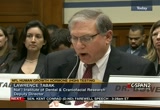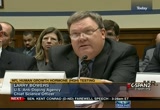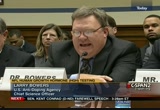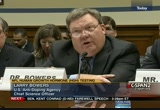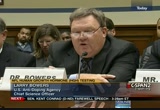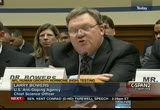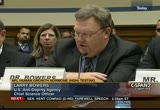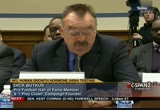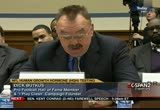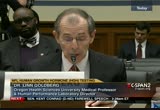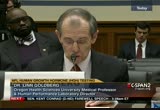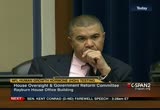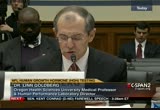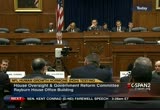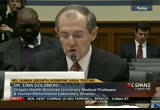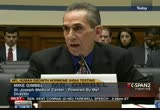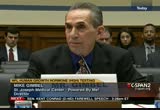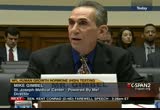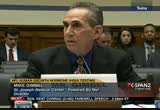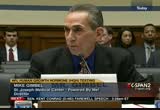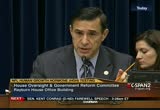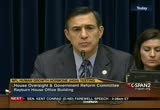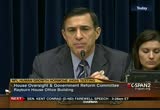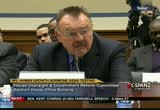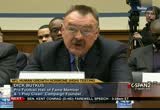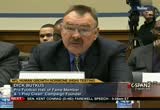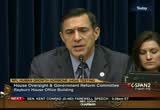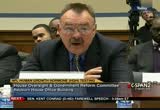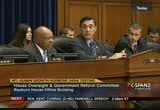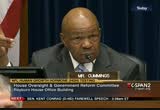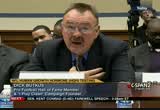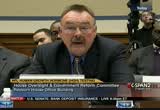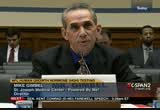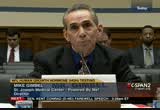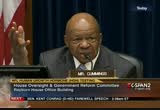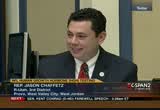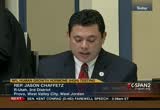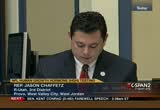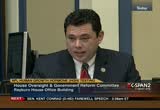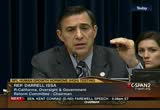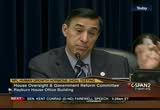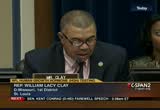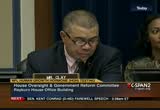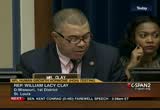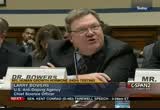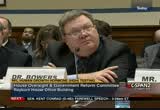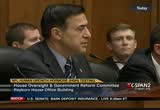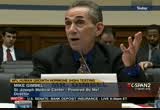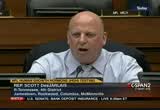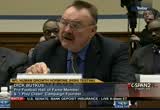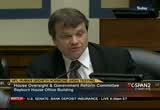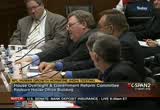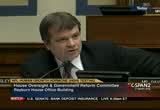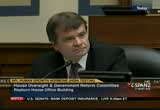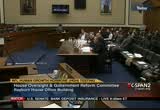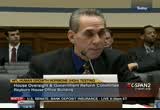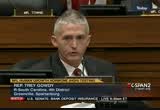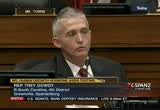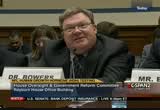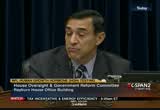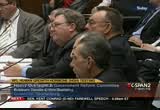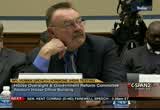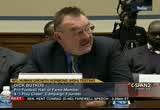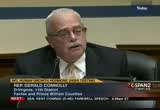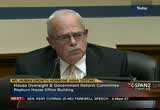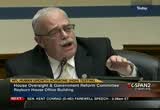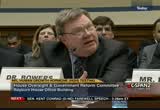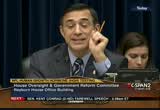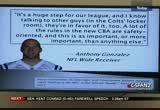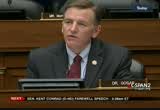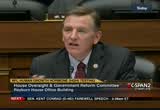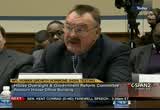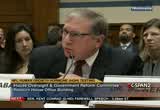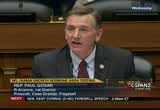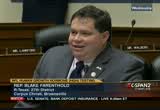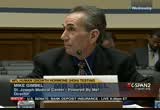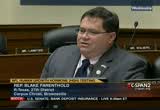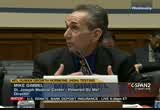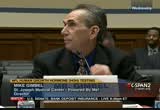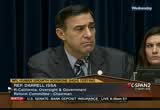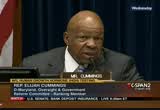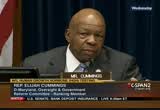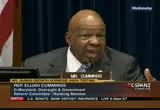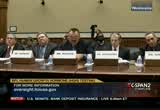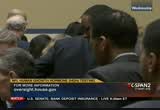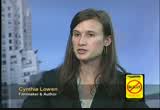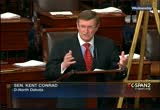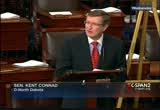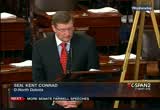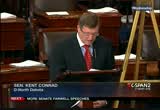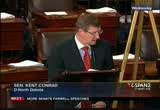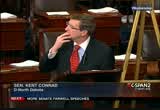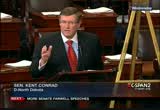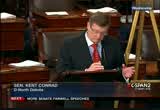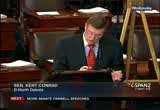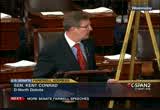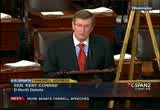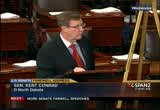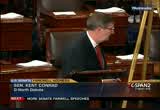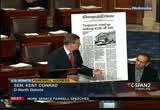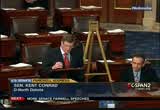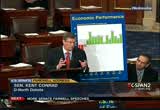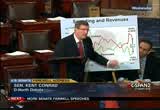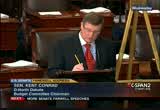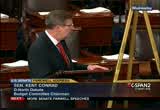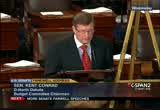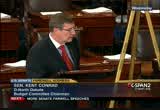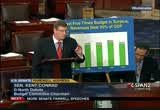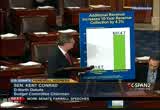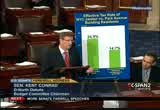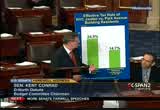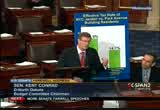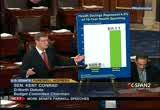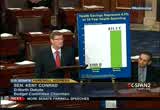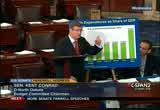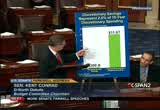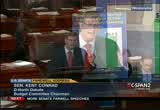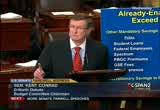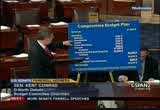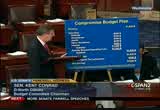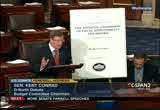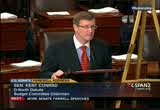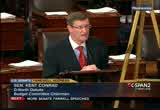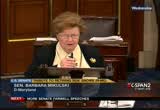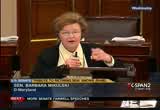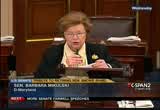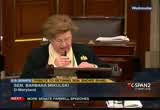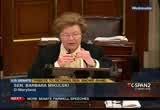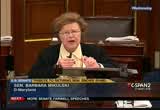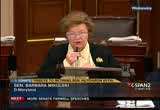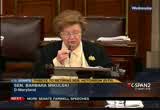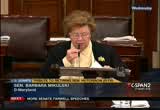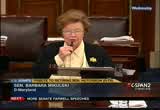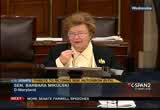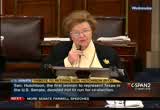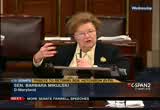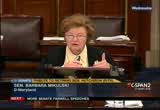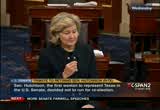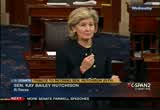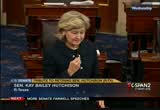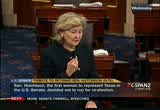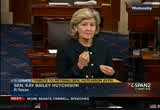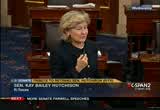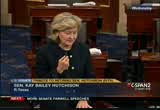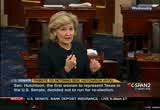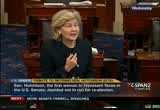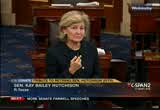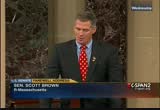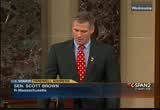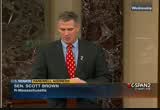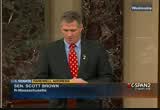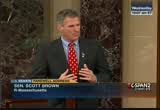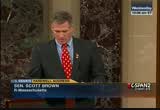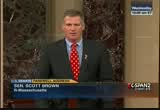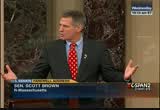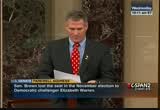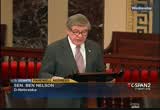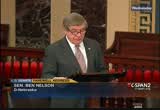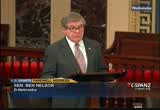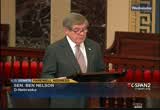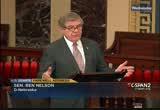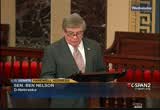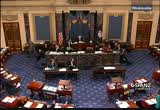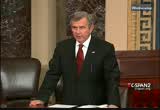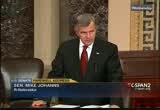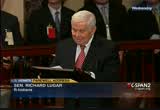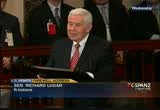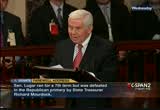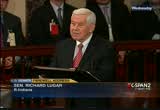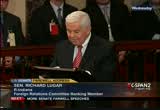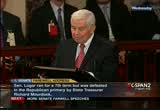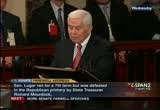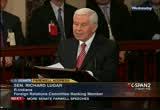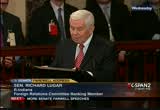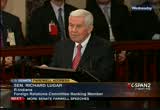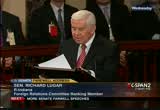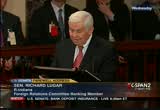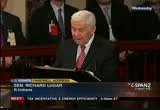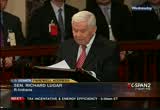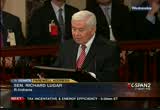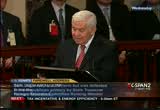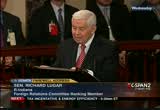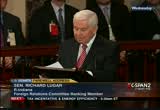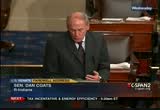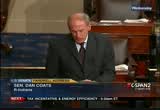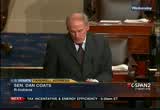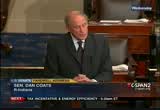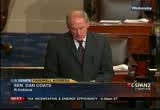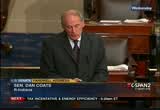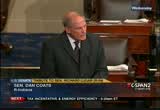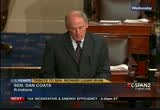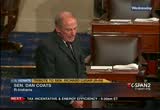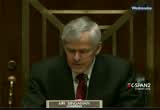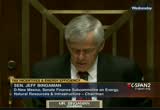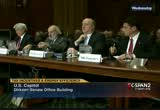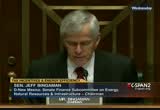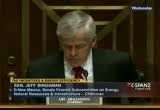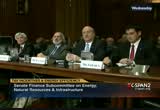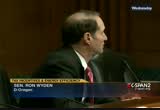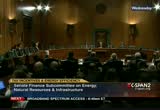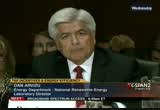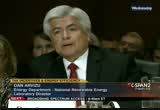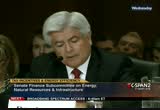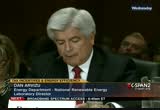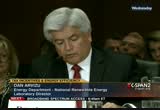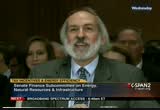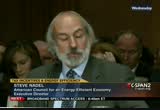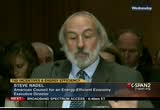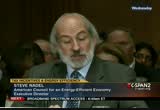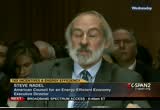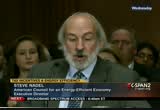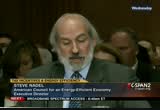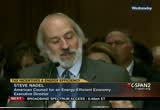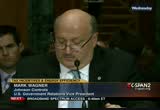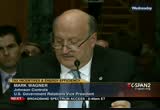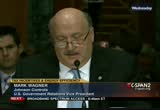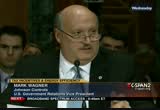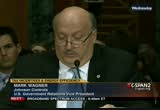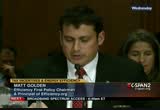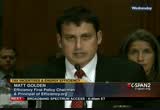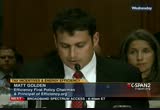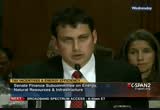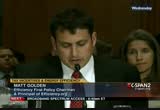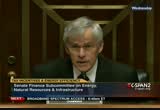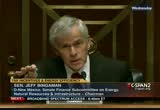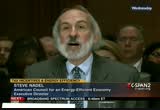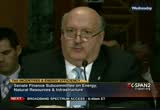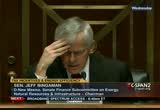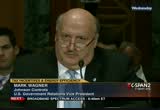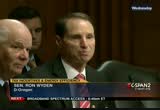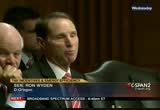tv Today in Washington CSPAN December 13, 2012 2:00am-6:00am EST
2:00 am
abuse, develop a test to provide formidable challenge but the technical obstacles have been overcome with the development of several testing approaches and i see my time is up and i will stop at this point. >> thank you and thanks for being such a good steward of your time. dr. bowers. >> good morning mr. chairman and members of the committee. my name is dr. larry bowers and i'm the chief science director for the anti-doping agency. i'd like to thank you with his opportunities to testify about the science behind growth hormone testing. i have been involved in the development of test for the pace of growth hormone since 1999. i was the director of athletic drug testing and toxicology laboratory at indiana university, at the time one of only two international olympic committee testing laboratories in the u.s..
2:01 am
3:28 am
3:29 am
give good, unbiased advice on complicated foreign relations issues. and we will very much miss senator lugar's voice here in the united states senate and also his better half, char lugar, who i think we all know is a bright light. so, senator lugar, it has been an honor and a privilege to serve with you, and i know that your voice will continue to be heard on the important issues of the day. so thank you for your service to our country and to your state, and thank you for being a good friend to me. mr. president, we have this long tradition in the senate of senators giving farewell remarks. i want to alert colleagues that mine will be especially long, so you might want go have lunch and then come back. so i don't consider this my
3:30 am
final speech, because i'm still hopeful that we will reach an agreement on a farm bill. the distinguished chair is here. i hope we can reach agreement on averting the fiscal cliff, because that's important to the country. so i hope we'll have additional chances to communicate with colleagues and the public before we're done. but this is my farewell remarks, observations on 26 years of service here, and it has been an incredible experience. first thing i want to do is say thank you, to you the people of north dakota for having -- thank you to the people of north dakota for having confidence to send me to represent them in the united states national. i was 38 you about but i looke, and people of north dakota elected me in a stunging upset of a long-established incumbent, and i treasure the confidence that they have had in me.
3:31 am
i also want to thank my colleagues for the responsibilities that they've given me, the leadership team, senator reid, senator schumer, senator murray, the confidence that they have had in me. and my staff, i have been so blessed to have people who have been with me, in many cases, for more than 20 years. my chiefs of staff, jim margolis, who has been one of the media gurus in the country now doing much of the advertising for the president in this last campaign. david herring, kent hall, who died on timely death working for me, care are garland, bob vanhuevland, wally, my legislative director who was with me for more than 20 years, tom mar, jerry gaginas, we all
3:32 am
fondly call "mom," because she cracks the whip and makes sure the trains run on time. mary naylor, also has been with me more than 20 years. my deputies there, john rider and joel friedman, who have done extraordinary work on behalf of the people of this country. stew nagerka, who is going to help me with charts today, my longtime communication communics director, and so many more. and most of all to my family, my wife lucy, who has been my partner through all this, was my campaign manager when i first ran for the united states senate, my daughter jessie, who in in many ways has perhaps sacrificed the most because when you're in this job, you miss birthdays, you miss other important events. but she has been a great daughter, and she was here last
3:33 am
night for our farewell party. and we had a lovely time. our son, ivan, and his wife kendra, who are in oregon where they have a small farm tawld tipping tree farm. we wish they could be here today, our grandson carter, who is a proud member of the university of oregon marching band, the ducks, who served as an intern for me -- not at government expense, by the way, that was at our expense. and our little dog dakota, who has become sort of a mascot of the united states senate. brian williams when he did a show on a day in the life of senate concluded that program by calling dakota the 101st senator. and, you know, i think he will be missed perhaps more than i am as i leave the senate. in 1964 i came here, i sat up in the gallery, in fact, it was the gallery right up here.
3:34 am
and i was 16 years old. and i watched a debate in the united states senate. it was on civil rights. hubert humphrey was leading that debate. and it so inspired me that i thought, you know, someday i'd like to be down on that floor and i would like to debate the great issues of the day and i would like to represent the people of north dakota. and so i went home and wrote out on the back of an envelope that i would run for the united states senate in 1986 or 1988 and i ran in 1986. and was successful. that is the power of a plan. to you young pages who are here, if any of you seek to be in the united states senate someday, have a plan. because there are so many people who sort of drift through life without one, if you have a plan, you will be light years ahead. and in that race as i indicated
3:35 am
my now wife, lucy, was my campaign manager. we won what was then believed to be the biggest political upset in the history of our state. and i was proud of that victory and proud to have a chance to represent north dakota here. i think we all know that our country needs a plan now. and we know that plans have worked before. i was here in 1993 when we had just come off the largest deficit in the history of the united states, the country was in doldrums, the economy was just plugging along, not doing very well, just had a weak recovery from a deep recession. and we passed a plan to get the country back on track. we did it the old fashioned way. we made tough decisions, some that were unpopular, but it was the right thing to do and it worked. we balanced the budget, we had
3:36 am
the longest period of uninterrupted economic growth in the nation's history, 23 million jobs were created, and we were actually paying down the debt of the united states at the end of the clinton administration. and we did it again when disaster struck my state in 1997, one of the worst disasters ever in north dakota, a 500-year flood that followed the worst winter storm in 50 years, many of you may recall the images from that disaster when firemen were fighting an enormous conflagration in downtown grand forks in the middle of a blizzard, and a massive flood. grand forks was devastated. again, we had a plan, a $500 million disaster recovery plan that became a billion-dollar plan and it worked and we did it the old fashioned way, we made
3:37 am
tough decisions, some that were unpopular, but it was the right thing to do and it worked. the community just held a recognition event for me this last weekend. and the leadership of the community was there, and various aspects of the community. reporting on the remarkable recovery in grand forks. it is really i think, an example of what can be done when government responds and does so intelligently and effectively. now we face a new challenge. we have a fiscal cliff or a fiscal cliff curb or whatever one terms it, but what we know is if we fail to act, we could be pushed back into recession. our country needs a plan. a plan to get us back on track, to revitalize economic growth, to secure our long-term economic future, and to get the country
3:38 am
moving again. and we can do it. we've done much tougher things in the past. you know, i hear people being critical sometimes when they leave here of this institution. let me say i'm not in their ranks. i leave this institution with enormous respect. the united states senate is the greatest deliberative body in the world, and the vast majority of my colleagues, i sincerely believe, are serious minded and have the best interest of the country at heart. i really believe the vast majority of my colleagues want to do what's right for the country. we have differences, enormous differences, about what's the right thing to do, but i have no doubt most of our colleagues are well intentioned. in many circles it's fashionable
3:39 am
now to bash government and play down its importance. i personally think we'd be well -- we would be well to remember what it has accomplished. i can remember so well-being called to an emergency meeting in this building in the fall of 2008. i was handed a note that i was urgently requested to come here. it was about 6:00 in the evening, and it was the last one to arrive. when i walked into the leader's office there were the leaders of the house and the senate, republicans and democrats, the secretary of the treasury from the bush administration, and the chairman of the federal reserve. well, i instantly understood something very serious was afoot. they closed the door and told us they were going to take over a.i.g., the large insurance company, the next day. they weren't there to ask for our approval or seek our agreement. they were there to tell us they
3:40 am
were taking this step. and they told us they were taking this step because they believed if they did not, there would be a financial collapse in this country within days. and they gave great speaker's deskity -- great specificity if they failed to take the action they were about to do. the public reaction was harshly negative. the notion of the government of the united states bailing out a large private insurance company created controversy and criticism for almost every corner. ultimately, the rescue of that company cost $180 billion. a staggering sum. but you know what? we've just learned this week that the taxpayers will make money on the deal.
3:41 am
yes, it cost us $180 billion. but the taxpayers are going to make $22 billion on the transaction. and if we hadn't done it, we would have risked going into a depression. so when people say there's no role for government or it should just be a limited, shrunken role, really? would we have wanted to stand by and risk this country going into another great depression? let's recall what that was like. more than 20% of the people in this country out of work. i know my open grandfather -- own grandfather who refused to take bankruptcy owned stock in the local bank. in those days you had unlimited liability. if you owned stock in a bank. so when there was a run on the bank, as there was, he was
3:42 am
called to bring money to the bank. which he did. and he did it over and over. and it took him nine years to recover. people were hungry. people were desperate. that's what a depression is about. so when i reflect back to those decisions, i believe they were the right decisions to make, and it's not just my view. that's the view of two of the most distinguished economists in this country, mark zandi, who was a key economic advisor to john mccain in his presidential race, and alan blinder, the former deputy chairman of the federal reserve. here's what they say. without that federal response, we would have had eight million fewer jobs and 16% level of unemployment in this country, and we would have been in the second great depression. they call it depression 2.0.
3:43 am
so, mr. president, let's remember where we were when president obama came to to office. the nation was facing the worst economic catastrophe since the great depression. in the fourth quarter of 2008, the economy shrunk at a rate of almost 9%. now, after the federal actions, positive economic growth returned in the third quarter of 2009, and we've now had 13 consecutive quarters of economic growth. now, we've come a long way. this is a remarkable turnaround in a very short time, measured against previous financial crises. in fact, there's been an academic study just completed that suggests typically it takes eight to ten years to recover
3:44 am
from a financial crisis. so the recovery here, while not everything we would have hoped, is a dramatic turnaround. at the same time, our constituents know, and we know, that the price has been high. we know that we are currently borrowing 31 cents of every dollar that we spend. that's somewhat of an improvement because we were borrowing 40 cents of every dollar we spend. so this is an improvement but we've got a long way to go. and the public understands that we face both a spending and a revenue problem. spending is near a 60-year high, as this chart shows. the red line is the spending line, the green line is the revenue line. but for those who say it's just a spending problem, i don't think the facts bear that out. because the revenue is near a
3:45 am
60-year low. i think most logical people would say you've got to work both sides of this equation. and when we look at our debt, we see that our gross debt has now surpassed 100% of our gross domestic product. there was a landmark work done just a couple of years ago by rogoff and reinhart. they looked at 200 years of economic history and they concluded once your debt exceeds 90% of your g.d.p., your future economic prospects are reduced and reduced significantly. future economic growth reduced by 25% to 33%. this is not just numbers on a page. this is a question of future economic opportunity. this growing debt is why many of us have called for action for a long time ago. in fact, it was six years ago
3:46 am
this month that senator gregg and i came up with the idea of a commission to tackle the debt. that idea, ultimately led to the president appointing the simpson-bowles commission. its bipartisan report recommended $4 trillion in deficit reduction in a balanced way and i think in a fair way protected low-income programs, it actually improved the progressivity of the tax system quite significantly, and it was balanced between revenue and spending. other bipartisan groups have concluded the same thing, that we need spending restraint and we need revenue. so there's a critical role for government here. we've seen it in the past, we'll find it in the future. but i think we also have to acknowledge there are problems here. there are problems in this chamber. as proud as i am of this
3:47 am
institution, and i will forever be, i have detected over the 26 years i've been here a change. and it's happened kind of gradually, but it's clearly happened. we spend now too much of our time seeking partisan advantage. and it happens on both sides. and it's all understandable. i understand it. i'm not being critical of individuals. we spend too little time trying to solve problems. we spend too little time in our caucuses, in our meetings, focused on how to solve the problems facing the country. i deeply believe that this observation is true. and i believe we can do better than this. the institutions of our government have a proud history.
3:48 am
the genius of our founding fathers can be found in every part of our history. whether it was conquering the last great fretion or winning world war i and world war ii or launching a man into space or conquering diseases, our government has bettered the plight of mankind. we need that kind kind of focus and effort now to address our challenges. i'm confident that we can do this. but it's not enough to be confident. it's not enough to be hopeful. it requires a plan, and i'd like to take just the next few minutes to lay out my belief of what that plan should include. mr. president, much of what i will talk about reflects the work of the bowles-simpson commission, the group of six i've been a part of, the group
3:49 am
of eight, but it starts looking at what both sides have laid down. republicans have laid down, a spending cut plan, the president has laid down a revenue plan. my own belief is we should take them both. we should take what the republicans have proposed on spending, with some modest modifications which i'll discuss, and we should take the president's plan on revenue. the president laid down a plan that said we ought to raise $1.6 trillion over the next ten years. boy, that sounds like an awful lot of money, doesn't it? $1.6 trillion. not billion, not million. trillion. and people will be quick to say oh, my god, that's the biggest tax increase history in of mankind. terrible. we can't do that. well, you know we need to put it in perspective. first thing we should recognize, this will take us to a revenue that is 19.9% of our g.d.p.
3:50 am
the last five times we balanced the budget in this country, going back to 1969, we've been at 19.7%, 19.9%, 19.8%, 20.6%, 19.5%. does 19.9% kind of fit in there? these are the only times we've balanced the budget going back to 1969. and to put it in each more perspective, how much revenue are we going to raise over the next ten years without any change? well, here's the number. $37.4 trillion. nobody ever puts these things in perspective, these big numbers in relationship to what. $1.6 trillion is in relationship to $37.4 trillion. as a percentage, that is an increase of 4.3%.
3:51 am
my goodness, we can't increase the revenue by 4.3% in this country over the next ten years? of course we can. of course we can. especially if it means we get our house in order and put the country on a firmer fiscal footing. and, you know, it doesn't just matter how much money you raise. it also matters how you raise it. we have got a tax code now that i can't defend. i can't defend. i took a study that was done by a man named martin sullivan last year. he did a very interesting thing. he looked at one building on park avenue in new york and he was able to do it because they
3:52 am
happened to have the statistics that isolate that one building. do you know what he found? that the average income in that building was $1,167,000 for the year. $1,167,000. the average tax rate of the people in that building was 14.7%. the janitor in that building had an income of $33,000 and he paid a tax rate of 24.9%. is this fair? is it fair that people making $1.1 million paid a tax rate of 14.7% and the janitor who served them, earning $33,000 a year, paid a tax rate of 24.9%? well, i personally don't think so. and i know all the arguments. i've served on the finance committee.
3:53 am
i've heard it all. the biggest reason for this differential, by the way, is not the earned income tax rate, which has had almost all of the attention in this national discussion. almost all of the attention has been on the earned income tax rate and raising it from 35% to 39.6%. almost no attention has been paid to the unearned income tax rate on capital gains and dividends. the unearned rate is currently 15%. that's what allows very wealthy people to pay a tax rate that is a fraction of those who work full time and are paying rates of 25%. so i hope that as we move to
3:54 am
conclusion here, we'll pay a little more attention to the unearned rates. you know, the truth is, you could not go as much -- have as much of an increase as being proposed on the earned income side and have more of an increase on the unearned income side and you'd make the tax code more fair and you could raise the same amount of revenue. mr. president, so that's the revenue side. but the spending side, republicans have laid down, they've put out a proposal that asks for savings out of entitlements and other discretionary spending. and, you know, if you look at their proposal and you break it down, again, let's look at health care. we are going to spend $11 trillion over the next ten years on health care. republicans are proposing saving
3:55 am
$600 million. if we had a compromise between republicans and democrats, let's say at $500 million, that would be a savings of, again, the magic 4%. we're going to increase revenue 4%. if we had savings on health care of 4.5%, we would save $500 billion. now, i mean, i've just had conversations with colleagues who've told me, we can't possibly save $500 billion out of health care. just like people say, well, you can't possibly increase revenue $1.6 trillion. really? we can't save $500 billion out of a pot of money where we're going to spend $11 trillion? i don't think that's true. i think we can save $500 billion. and i'll tell you, there's somebody sitting on this floor that's got a pretty good idea how to do it.
3:56 am
senator sheldon whitehouse has said to us over and over and over, we are spending more than any other country in the world as a share of our national income on health care. we're spending 18% of our g.d.p. on health care. no other country spends more than 11.5%. and the best minds in the country have told us we're wasting hundreds of billions of dollars in health care that don't improve health care outcomes at all. and if we would save money in overall health care, 40% of that savings would flow through to the federal government. senator whitehouse is right about this. we ought to focus like a laser on where the waste is. you don't need to increase the eligibility age for medicare. you absolutely do not have to do it to save $500 billion. but what it would do if you save
3:57 am
$500 billion is it would keep the growth in health care spending about equal to the growth in the overall economy. that would stabilize the growth of health care spending. that would be a huge contribution to the economic competitive position of the united states. now, mr. president, the republicans have also said, hey, let's save $300 billion on domestic discretionary savings. now, i'd be the first to say, we've already had lots of savings on the discretionary accounts. we've saved over a trillion dollars in the discretionary accounts. but they say, okay, let's save another $300 billion. i think we should say, we'll do it if you go with us on the revenue. we'll do it. because that represents savings of 2.6% of the $11.6 trillion
3:58 am
we're going to spend in the discretionary accounts over the next ten years. now, i think, you know, we've kind of gotten into a situation here where we use numbers that are absolutely big numbers but we don't put them in perspecti perspective. we can't save 2.6% out of the discretionary accounts? well, i believe we can. i absolutely believe we can. i believe we can save more out of defense. and i've been somebody, i've supported every penny. i didn't vote for going to war in iraq, thought that was a huge mistake, but i've supported every dollar of spending for our troops in the field. and i can tell you, as a budget committee chairman, we can save more money in defense. and there are lots of republicans who know we can do it, too. mr. president, other mandatory, that's another category the republicans said save $300 billion there. i think they're $100 billion too
3:59 am
high because we've already saved over $100 billion out of other mandatory spending in the budget deal we did last year. so let's save $200 billion. that would represent, again, 4% of what we are projected to spend over the next ten years in other mandatory spending. $5.1 trillion is what we're programmed to spend. $200 billion of savings there would represent 4%. again, i've had colleagues tell me, well, we can't possibly save $200 billion. i've had some staff people tell me we can't save $200 billion. so i say, okay, how much are we going to spend? how much are we going to spend? that $200 billion represents 4% of what we're going to spend. we can't save 4%? yes, we can. yes, we k. you know, -- yes, w. you know, i was elected on the slogan in 1986 of, "yes, we
4:00 am
can." and somebody else used that slogan a few years later. president obama used that slogan "yes, we can." called me up, said, "do i owe you royalties?" i said, no, i'm glad you're using it. but yes, we can. we need more of a "yes, we can" attitude around here. so when i rack it all up and i look at what we've already done, we've saved a trillion dollars in the budget control act of last year, and here -- here's other mandatory savings. i just talked about $129 billion that we've already done. $900 billion of other discretionary savings, already done. so we put that in the bank. we use that as the base. and you put it all together and here's what you've got. save another $200 billion on defense, have revenue of $1.6 trillion, which is the president's proposal, have $100
4:01 am
billion of non-defense. that gets you the $300 billion the republicans have asked for. on health care, you do $500 billion. that's close to what they've asked for. a hundred billion less. other mandatory, $200 billion. that's close to what they asked for. a hundred billion-dollar difference reflects what we've already done. interest savings, because you're spending less and you have more revenue, you save interest, $400 billion. that gives you a total of spending cuts of $1.4 trillion. you add in what's already been done, $1,05 trillion and you've got a total of $2,450,000,000,000. you add that to the $1.6 trillion of revenue and you've got $4,050,000,000,000 of savings. and then i personally would extend the payroll tax holiday
4:02 am
because c.b.o. tells us on the tax side, that's the biggest bang for the buck in giving lift to the economy. it costs you $200 billion. for a net deficit reduction of $3,850,000,000,000. for those who are wondering, well, what happens to a.m.t. and what happens to the doc fix? we have those in the baseline so they're covered in this proposal. you can correct the alternative minimum tax, you can eliminate the doc fix, be done with it. mr. president, this magnitude of packages is precisely what was called for in the fiscal commission. in the moment-of-truth report, this is what they called for: i think they were right to call for it. i was proud to be part of that effort. i believe this is precisely what we need to do now. so that's the plan.
4:03 am
now we need action. we should do it the old-fashioned way. we should make tough decisions, even some that will be unpopular. but it will be the right thing to do, and it will work. it'll stablize our debt and begin to bring it down. it will provide certainty to our economy. it will unleash, i believe, the $1.7 trillion that are on the balance sheets of our corporations. it will unlock the investment potential that lies all across this country. mr. president, let me just end as i began by simply saying "thank you." thank you to the people of north dakota, thank you to my colleagues, thank you to my staff, and, most of all, thanks
4:04 am
to my family, to my wife lucy, to my daughter jessie, to our son ivan and his wife kendra and to our grandson carter. and to all my family members, my cousins who have been with me in every campaign, i will never forget your support on the one hand your help, and i will always consider serving here the honor of my life. i also want to thank my colleague, senator hoeven, who in the two years that he and i have overlapped has been a good colleague. i have enjoyed working with him very much. i just would close by noting, because many of you know i'm sort of a numbers guy, that i started these remarks in the 12th hour of the 12th day of the 12th month of 2012.
4:05 am
4:06 am
be vacated. the presiding officer: without objection. ms. mikulski: madam president, i rise during this morning business time to speak, particularly during this time of tension, we're looking at the fiscal cliff, to really use a few minutes to pay a tribute to two wonderful, outstanding senators who will be leaving us at the end of this term that i have served with. wonderful women named senator olympia snowe of maine and senator kay bailey hutchison of texas. dear friends across the other side of the aisle but though they were on the other side of the aisle there was no great divide between us. we have known each other for many years. a -- a few words i'd like to say about my very dear friend, senator olympia snowe. i served with senator snowe both in the house of representatives and then in the united states senate.
4:07 am
wow. what an outstanding senator and congressperson she has been. and i know we will continue to see senator snowe in some type of role in public service, because that's just the kind of person she is. she is deeply in her d.n.a. a public servant. senator snowe has served her state of maine and our nation so well. she's one of our most respected members of congress, known for her civility, her sensibility, her mastery of the substances of the issue. and i might add, she brings that new england sense of a more frugal government but at the same time shows that you can do it in a compassionate, smart way. i know her as a cherished friend and a dear colleague and a crucial partner on so many issues. as i said, we served in the house and the senate together. we have worked on those issues i talk about, the macro issues and
4:08 am
the macaroni and cheese issues. we fought for a better economy, particularly in the area of smaller -- small business, a safer country as we worked on the intelligence committee together, and a more efficient government. and also we worked together on many issues pertaining to women. in the area of small business, she is currently the ranking member on the small business committee with our other colleague, senator mary landrieu. she knows the backbone that runs the economy is small business. and she also knows it's the backbone of the american economy. i've watched her day in and day out being concerned about her fishermen who are out there working in the cold waters off of georgia's bank for lobsters, to the small shop owner on main street, from the potato fields and lumber yards to l.l. bean, olympia snowe has stood up for them but also for the big issues
4:09 am
in terms of jobs in the bass shipyard. in national security, we have worked together to look out for our troops here and to protect our communities from predators over there. she's been steadfast and true. it's a committee that meets often behind closed doors, but i will tell you, there is a senator that continue to look out for the safety of the american people. one of the areas that i've had the closest work with her is in the area of women's health. you might be interested to know that senator snowe and i received the good housekeeping award for house standing achievement in what we did to advance the cause of finding a cure for breast cancer. now, when i called my sister and told her i was getting a good housekeeper award, she thought it was the funniest thing she'd ever heard. when i told her i was getting it with olympia snowe, she knew it had credibility. i say that because what we did and what we did in working
4:10 am
together was in medical research and in clinical trials. you might be interested to know that when i came to the senate, the only other woman senator was senator nancy kassebaum, another wonderful person from across the aisle. women were not included in the protocols at n.i.h. can you believe that? that famous study, take an aspirin a day, take a heart attack away, was done on 10,000 male medical students. not one woman was there. they regarded including women in research that would present deviant results. we were known as the deviant results. well, pat schroeder, olympia snowe, another republican, connie morella from maryland, we said this couldn't continue to go. so we organized across the dome, across the aisle and we went across the beltway to n.i.h. and we pulled up and demanded
4:11 am
answers on why -- scientific answers on why we weren't included. the day we pulled up in our cars on a bipartisan basis, george bush the elder appointed bernadine healy to head n.i.h. and then working together, again, across the aisle and across the dome, working with senators contain i did and kenne established the office of women's health at n.i.h. the famous hormonal replacement therapy study was done. it resulted in massive change in the way doctors treated women and it has reduced breast cancer rates 15%. so i say to all, when you ask, what did olympia snowe did? she would say, i worked on a bipartisan basis. and because of what she did, we did, we all did working together, men and women, house and senate, we have saved lives of women 1 million at a time.
4:12 am
i think that's a pretty terrific accomplishment. and no matter what senator snowe does, she can cherish in her heart that she did that. but while we were busy doing the big picture, she helped me with an individual picture. we went to the refugee camps of cambodia together, along with the congresswomen. it was when the killing fields were at the highest. we saw the horrible consequences of war. we worked together to field the children. we worked together to feed the children and care for the children. i met a young girl in a refugee camp in the catholic relief feeding camp. working with senator snowe, we brought that little girl to the united states of america. she's alive here today, married and living in an american citizen. so what did olympia snowe do? she saved jobs and she saved lives, and i'm proud to be par part -- work with her. and we're going to miss her. and then there's my good friend, kay bailey hutchison, who's just
4:13 am
come to the floor. and i'm glad she's going to be here to hear what i've got to say about her. i hold her in such enormous high esteem. now, senator kay bailey hutchison is known for her competence, her strong character, and being an outstanding champion for texas, an advocate for women, and a real patriot, dedicated to serving our nation. i, too, know her as a dear friend, someone deeply committed to creating that zone of civility among the women of the senate. when senator hutchison arrived in the senate in 1983, this is -- there were -- there were prickly politics beginning to emerge. she had come from the texas legislature and knew the dynamics of a rum and tumble legislative -- a rough and tumble legislative body. but as we worked together on something called the homemaker ira, we said, why don't we just get together to see if we could create a zone of civility.
4:14 am
that's when we brought the women together for those monthly dinners. rules were no staff, no leaks, no memos. we talked about everything from hair-dos to hair-raising. how we could stop the global war against terror and fight the deadly scourge of breast cancer. we worked together, again across the aisle. in 1992, we also worked to hold these power workshops to make sure that every woman could know how to get started in the senate, and we worked together on that. the other thing that senator kay bailey and i helped establish was that we could disagree without being disagreeable. we, the women of the senate, do not have a caucus because we represent states -- that's what the constitution says is our j job; we're here to represent states -- we also have different philosophies and viewpoints on governance. but we also know we can disagree without being disagreeable. a story i'd like to tell is during the lilly ledbetter fair
4:15 am
pay act. senator hutchison and i agreed on absolutely the same goal -- equal pay for equal or comparable work for women. however, we disagreed on the means. we offered -- senator hutchison had about nine amendments. we duked it out here. we went earring to earring in terms of our debate. and the senate commented what intellectual rigor it had, what a sense of comity and exchanging of ideas. and at the end of the day, we think we came up -- we not only passed the legislation but we did it in a way where everybody could feel proud of the process. why can't we do that every day? gee, i wish we could. then working with senator hutchison -- and this is how we got started -- was on the homemaker ira. this was senator hutchison's idea. she came to me and she said, you know, senator barb, there are
4:16 am
stay-at-home moms, they are limited to only $500 to what they can contribute to an ira. and if they have the money and if they have both the will and the wallet, we should give them the same tax opportunities as if they were working in the marketplace because the work at home should be valued as well. and absolutely, we changed that legislation. and, madam president, i have pending here a legislation to permanently change the name of that homemaker ira to the hutchison ira, because she really did lead the way. i was an able ally. and we made a difference. so i could go through item after item, the way we've worked on breast cancer together, the way we've worked on appropriations. she has -- is my ranking member on commerce, justice and science. we've worked together on the space program. we've worked together to keep
4:17 am
our -- our areas safe. from the start, we shared a personal commitment that technology in space could help america remain exceptional. a belief in supporting the research in science leading to new ideas that would be not only new areas that we would explore but new technologies for new products and new jobs. yes, i visited her dad at mission control and i've been there during the great research that we were able to see being done in that area. she, too, remember, the home of the komen foundation is in texas. but it is not -- senator hutchison was very clear that she wanted to be sure that she, too, was an advocate for women's health. we worked together on mammogram quality standards. madam president, were you aware that in the early days -- and i know sometimes we sound like we built the pyramids together when i tell these stories -- it is
4:18 am
both ancient history and a recent reality. if you went into a doctor's office 10, 12 years ago for a mammogram, you might have gotten a chest x-ray and they would have called it a mammogram. it was often given by untrained technicians, no standards for the equipment, that it would really work the way it's supposed to work, f often uncalibrated and ineffectual. senator hutchison and i worked using sound science, thorough hearings, working with the institute of medicine, f.d.a., the national institutes of standards. and now if you go into your doctor's office for that mammogram, you'll see a certificate from your government that says, this is a place where when your -- that you know that the mammogram -- the technology will work and the people who will be giving it will be trained. you know, once again, early detection and screening, saving lives a million at a time. isn't that fantastic?
4:19 am
and again, across the aisle we were able to do that. we also did a book together. she was the leader in helping us get our famous book, "nine and counting." maybe it will be time for another book. but when the chapter of the history of the senate is written, we want to be sure that the chapter really includes a big statement to the work of senator kay bailey hutchison. you know, again, in this institution, it is the personal relationships built often on policy. i know -- i met -- i went to texas to tour the space program with senator hutchison. that's where we heard about the national space biomedical research institute at baylor. i was there. i met senator hutchison's brother who faced the same blood cancer disease that geraldine ferraro faced. gerry and her brother became fast friends so kay and barb
4:20 am
teamed up and again we pushed research at n.i.h. there -- yo you know, cancer kns no party, it knows no zip code, it knows no ideology. but it knows that we need to work together to be able to do it. and on that wonderful day of friendship, where we learned the best ideas that will come out of our work in the space program to deal with the dreaded cancer words, the kinds of things we study in space will help us be more effective on earth. kay invited me to the houston livestock show and rodeo. now, madam president, i grew up in baltimore -- you have been there many times yourself. you know it is a city known for his row houses, not for its rodeos. kay invited me to come into the rodeo in the astrodome. with i showed up, to her surprise -- well, i showed up, to her surprise. i had little boots on, a cowgirl
4:21 am
hat and a vest. she put me in a buckboard and deep in the heart of texas we circled the astrodome together. i was in a buckboard. she was in a pall m palomino neo me. at the end of the evening, i was there munching on barbecue, affectionately called buckboard barb, and that's the kind of thing -- and i have the pictures to show it. they're locked up. i don't widely distribute them much but it was a heck of an evening. i say that because, again, out of that comes great friendships that also lead to smoothing the way, not paving -- actually, not smoothing the way -- paving the way, where we put our heads together to solve our national problems, a understand t and toy where we get the best ideas from
4:22 am
a variety of approaches. and at the end of the way, we feel better but america is better off. i'm really -- i'm pretty emotional actually when i think about olympia and kaye. we've been -- we've been together a long time. we welcome you and your generation, but for those of us who maybe we didn't build the pyramids, i hope senator hutchison can know there's a latin saying that i learned in a catholic girls school many years ago and i'll spell it for you. [speaking latin] -- we will build a monument more lasting than bronze. when senator hutchison returns to texas to find a new way to serve the people of this country, she knows that here in this institution, along with senator olympia snowe, they built monuments far lasting than any statues or any made of bronze. they have made a difference in the lives much people and
4:23 am
they've done it in a way that they can be proud of, that we can all be grateful for. madam president, i yield the floor. mrs. hutchison: madam president? the presiding officer: the is senator from text. mrs. hutchison: madam president, i am so touched by the comments by my colleague, senator mikulski, about myself and olympia. and i appreciate so much that she has singled us out because senator mikulski is a pioneer. she didn't build the pyramids, i might say, but it was close. she was in the house first and then came to the senate. she is our longest-serving woman senator. and she will probably be the dean of all the senate at some point, because she is a legend. she is a legend in the senate. she is a legend in maryland. she is a legend in our country. and when i think back of the
4:24 am
things that we've been able to accomplish -- and i -- it's not that it was just because we were women and we were here. but in a deliberative body, where you have 100 people representing 50 very different states, it's not that the men aren't -- are against anything that we have teamed up to do. it is that is, because of our experiences that we bring to the table, sometimes it wasn't thought of before -- before nor mikulski and -- before senator mikulski and other women came. and i'll just point out a couple of things and embellish a little bit on what the senator said. when we wrote the book "nine and counting," there were nine women in the senate at the time. and it came from something much bigger. it came from a meeting that senator mikulski brought
4:25 am
together of the women of ireland and northern ireland. and it was the catholics and the protestants who were trying to probe the women senators, the nine of us who were here, about how they could be effective in making peace in northern ireland. and when we started telling our stories to them, to encourage them, that they could make a difference in northern ireland, barbara mikulski and i looked at each other and we said, you know, there's a book here. there's a book about the obstacles that women have faced getting to the united states senate and a book that can encourage our girls and our young women that they can have a part in settling the major issues of our country. and it was from that that we
4:26 am
contacted bob barnett, who is the agent of senators and house members who write books and also cab net members and presidents, and we said -- and also cabinet members and presidents. and we said, you know, we'd like to get together and write a book and h we immediately got togethr and wrote a book. and she got a writer who went to each of us and interviewed us and wrote our stories, which were in our own words, and we got together and decided to give all of the proceeds to the girl scouts of america, which was a common organization that had affected almost every one of the women at the time. girl scouts giving leadership capabilities to the girls in our country and i've been a girl scout, barb had been a girl scout. so our book is still in print,
4:27 am
and it has raised tens of thousands -- if not hundreds of thousands -- of dollars for the girl scouts to continue their leadership programs. and it all came from something that we learned about each other. and i think that the multiple myeloma, which my brother has and which geraldine fe ferraro , was another area in which barbara and i boun bonded, and i bonded with geraldine ferraro, too. she encouraged me a lot. barbara mcskul mikulski, who war friend of geraldine ferraro, and who spoke at her funeral -- and we both went to that funeral -- and we were able to pass legislation that did provide for
4:28 am
funding for an educational fund for the research and education for multiple myeloma and we named it "the geraldine fer real estatfer realfeferregard co" dii only died a year and a half or so ago. her brother is a fighter and he is still going and doing great and now becaus beaver because or research, i'm going to tell you, we're maintaining. and we are letting people live a quality of life, because we teamed up and barbara tells the story -- i'll tell you the other side, the other part of the story about the houston road yeahrodeo,because they still tat buckboard barb. she came to the rodeo from her
4:29 am
sort of ethnic background in baltimore and she was such a great sport. and i was riding my horse in the grand entry and barb was in the buckboard. and she was waving and having the best time. and of course all of us were in our rodeo attire, which was sort of foreign to bar shall be, i -o barb, i have to say. but she was in there with her boots and her big-hair hairdo. and barbara leaned over to me and she said, okay, kay, if we were here monday morning and we went to a chamber of commerce meeting, would these people look like this? i still tell that story in houston, texas, which they love. and, of course, i said, oh, yeah -- which wasn't true. but i loved it. she was the best sport, and they
4:30 am
still talk about her. and they did give her a cowboy hat that was to die for. and let me mention one other -- and i know that senator akaka is there, and i won't take much more of your time. we teamed up on single-sex schools. the senator from maryland mentioned her catholic girls school upbringing. hillary clinton, barbara mikulski, susa susan collins and myself teamed up to assure that every girl in this country has the opportunity if their school board decides to offer it as an option to go to a girls school, and likewise every boy whose school board decides that would be better for the boyce -- in middle challenge especially and high school. because we teamed up after about 15 years of trying, starting with jack danforth from missouri, who started the effort
4:31 am
to allow single-sex schools in our public entities in america. when i came here in 1993, we finally passed it with our coalition saying, we know that this can be better for some girls and some boyce - boys. not all. but it was, i will say to the distinguished presiding officer, it was the young women's leadership academy in harlem, new york, that gave us the courage to say, this can be done, because they fought all the efforts to not allow it, all the lawsuits, they stood up -- and hillary clinton went to visit the young women's leadership school. i took rod paige, the secretary of education, right there to new york, and i said, secretary paige, we can do this for all americans. we can. and hillary and i and barbara
4:32 am
and susan said, we're going to, and we did. and it was a great accomplishment. i just want to end by saying that i so appreciate barbara mikulski and john cornyn introducing the bill to name the homemaker ira for me. it will mean so much to me because i had the experience as a young single woman starting an ira, getting married, and being told, i really couldn't provide for my own retirement security. and i knew that there were so many women who, through divorce or death of a husband -- and they'd gone in and out of the workforce or never been in the outside workforce, and they couldn't save for their own retirement security.
4:33 am
and when i went to barbara, i said, barbara, it's a democratic senate. i will make it bill high-incomel make this bill mikulski-hutchison to get it passed. senator mikulski said, not on your life. it will be hutchison-mikulski, because it is your idea. and she worked just as hard as if it were the reverse. that says more about the senator from maryland than anything i can say. and thank you, barbara, for introducing the bill that would name it for me because i know it will help women long after i leave. and i thank you. and i yield the floor.madam pre.
4:34 am
i want to commend the minority leader on the nice tribute to senator snowe. i rise today to give my closing floor speech for this session in the united states senate. from the date of my swearing in on february 4, 2010, until the last day that i serve in this great chamber, which is a month shy of three years serving, i still say and believe aside from my marriage to my wife gail of 26 years and the birth of my two children ayla and arianna, serving for the great people of massachusetts in the people's seat has been the greatest honor of my life. i want to thank the people of
4:35 am
massachusetts for that opportunity to think that someone like me whose parents were married four times each, lived in 17 houses and subjected to forms of abuses growing up has the chance to serve in one of the greatest deliberative bodies in the world is something i will soon not forget. to the young people sitting here and may be watching, take it from me that in this country even when it seems you're fighting against all odds, anything is possible for you. there are no obstacles that cannot be overcome, so do not give up and always follow your dreams. as i have said before, a person has no business in politics unless they respect the judgment of the voters. and if you run for office, you've got to be able to take victory or defeat in a gracious manner. i do respect the judgment of the voters. i accept their decision in this election with the same attitude and sense of appreciation that i held when i arrived here in this chamber almost three years ago.
4:36 am
when i was sworn in, i was the 1,914th senator accepting the oath of office by signing the book right up at the clerk's table. and there were many senators that served before me, and there will be many senators that serve after my service is over. that my name is listed amongst them is very, very humbling. to all the people of massachusetts, i greatly appreciate the confidence that you placed in me for the past three years in allowing me to represent you in the united states senate. to my colleagues, i want to thank you for the courtesy and friendship that you afforded me during my time here. when i arrived here, i promised that i would read the bills, see how they affected massachusetts, see how they affected our country, our deficit and i would vote in an independent manner based on the merits of that issue rather than political partisan politics. and i'm proud that i did keep that promise to be independent.
4:37 am
i'm proud that my voting record has identified me as the second-most bipartisan senator in the united states senate as referenced by "congressional quarterly" and i was named as the least partisan senator in the united states senate by washingtonian magazine. it was the independent and bipartisan approach that provided me with an opportunity to stand with the president at the white house on three separate occasions in the past two years to see bills that i had either sponsored or played a key role in securing their passage into law. i was honored to work with many of my colleagues that are here today and many who are listening on both sides of the aisle on legislation that was signed into law to move our country forward, including the stock act to ban insider trading by members of congress. madam president, you played a key role in that as well. the hire a hero veterans bill to help our veterans fighting for jobs actually have opportunities to be hired by employers who are looking for those heroes.
4:38 am
the crowdfunding legislation which will help young entrepreneurs get access to new capital and create jobs, something i hope the s.e.c. will immediately come up with a rule so these people can start creating jobs and raising money. legislation to reform wall street, where i was the deciding vote to strengthen our country's financial system. legislation to eliminate an onerous 3% withholding tax, the stealth tax that would have affected government contractors. that's also gone and into law. legislation to ensure that our fallen heroes receive the dignity and respect they deserve at the arlington national cemetery. and that's something now that is also fixed. and many, many other congressional actions that have made a difference not only in massachusetts, but in this great country. these are all shared successes that i was proud to be part of each and every one of them. i have always said that in order to do our business as our country's leaders, we must do our work in a bipartisan,
4:39 am
bicameral manner to ensure that the actions taken by congress benefit all americans. not just those of one political party or one political ideology. during my time here and now as i'm leaving, i have been and still am deeply concerned about the lack of bipartisan efforts to solve our country's most pressing economic challenges and in turn move our country forward. many times political party and personal gain is put before the needs of our country. i know we can do it better. the american people expect us to do it better. and as i leave, i challenge the leadership on both sides of the aisle to make the process more open and transparent. i challenge members to work with each other in a more open and honest manner. and i challenge the president and the congressional leadership to also work together immediately to address the concerns and needs of our country, because after all, we
4:40 am
are americans first and our country deserves better. in closing, you see my staff here. many of them who were here from the beginning. they came from applicants over 4,000 for a very select few jobs. i want to thank vanessa centers, my chief of staff, and each and every one of the staff for the amazing work that they have done in really interesting times to come here as the 41st or the 60th senator and have the media scrutiny and all the commentary from every special interest group around the country in the middle of a senate that was gridlocked, and to come here and have an opportunity to make a difference and do it well without making any mistakes is something i think benefited massachusetts but also benefited this great country. it allowed for the debate to resume once again, to eliminate a supermajority so one side could ram through things that had other side had no play or no involvement in.
4:41 am
that's not what our country is about. that's not what this chamber is about. we deserve better. the people of massachusetts and the people of this country deserve better. they deserve to have their voices heard. every person in this chamber has one vote. and to think that one side or the other, depending on who's in charge, is going to stifle that one senator from whatever part of the country, to let he or she have their moment to express their views on something that is important to them and their constituency, to shut that off and put your thumb on it is not the way we should be doing it here. and i'm deeply concerned about any changes in the rules that are being proposed to eliminate the ability for both sides to battle and do battle in a thoughtful, respectful manner. if you see the movie "lincoln" you saw back then they were battling for months at a time in order to convince each other to go one way or another. since when has it been a problem to actually have vibrant debate in the united states senate, in this great chamber? since when?
4:42 am
what is everybody scared about? i don't understand that. so i'm hopeful -- i'm hopeful that the leaders will come together and recognize that we need to continue hof that vibrant -- continue to have that vibrant debate. that's what makes this chamber so unique than any other chamber throughout the world, any other government, any other form of government throughout the world. and to take that away and limit it i think is a big, big mistake. i want to say thank you obviously to the people of massachusetts to entrusting me to sit in the people's seat for the past three years. i want to thank my colleagues who are here, whoeufd some great -- who i have had some great friendships and opportunities to work with. as i've said many times before, temporary victory and tkwet is is -- and defeat is temporary. depending on what happens and all of us, we may obviously meet again. but i'm looking forward to continuing on with those friendships, continuing on working with my staff. and i want to thank you for thee
4:52 am
4:53 am
deeper attention to a number of issues that have been a part of my senate service. among these are preventing the pro proliferation of weapons of mass destruction and developing more efficient ways to feed the world. i'm especially pleased that i'll be serving on the faculty of the university of indianapolis and helping that institution establish a washington internship program. i look forward to announcing additional endeavors of service in the coming weeks. my service in the senate would not have been possible without the encouragement and the constant support of my loving wife, shar, our four sons, mark, bob, john and david, and the entire lugar family, most of which is with us here in the galleries today. their strength and sacrifices have been indispensable to my
4:54 am
public service. i'm also very much indebted to a great number of talented and loyal friends who have served with me in the senate, including, by my count, more than 300 senators, hundreds of personal and committee staff members, and more than a thousand student interns. in my experience, it is difficult to conceive of a better platform from which to devote one's self to public service and the search for solutions to national and international problems. at its best, the senate is one of the founders' most important creations. a great deal has been written recently about political discord in the united states, with some commentators judging that partisanship is at an all-time high. having seen quite a few periods in the congress when political struggles were portrayed in this way, i hesitate to describe our
4:55 am
current state as the most partisan ever, but i do believe that as an institution, we have not lived up to the expectations of our constituents to make excellence in governance our top priority. many of us have had some type of executive experience as governors, mayors, corporation chiefs, cabinet officials. i had the good fortune of serving two terms as mayor of indianapolis prior to my senate service. and for the last 36 years, i've attempted to apply lessons learned during those early governing experiences to my work in the senate. as a mayor, my responsibility for what happened in my city was comprehensive and inescapable. citizens held the mayor's office accountable for the prosaic tasks of daily life, like trash collection, fixing potholes in the streets, snow removal, but
4:56 am
also for executing strategies for the economic and social advancement of the city. in legislative life, by contrast, we are responsible for positions expressed through votes, cosponsorships, interviews and other means. it takes courage to declare dozens or even hundreds of positions and stand for office knowing that with each position, you are displeasing some group of voters. but we do our country a disservice if we mistake the act of taking positions for governance. they are not the same thing. governance requires adaptation to shifting circumstances. it often requires finding common ground with americans who have a different vision than your own. it requires leaders who believe, like edmond burke, that their
4:57 am
first responsibility to their constituents is to apply their best judgment. it is possible to be elected and reelected again and again and gain prominence in the senate while giving very little thought to governance. one can even gain considerable notoriety by devoting one's career to the political aspects of a senator's job; namely, promoting the party line, raising money, focusing on public relations. responsibility for legislative shortcomings can be pinned on the other party or even intractable members of one's own party. none of us are above politics nor do the founders expect us to be, but obviously we should be aspiring to something greater than this. too often in recent years, members of congress have locked themselves in to a slate of inflexible positions, many of
4:58 am
which have no hope of being implemented in a divided government. and some of these positions have been further calcified by pledges signed for political purposes. too often we have failed to listen to one another and question whether the orthodox views being promulgated by our parties makes strategic sense for america's future. the result has been intractablely negative public perceptions of congress. a rasmussen reports poll done just this month found that only 10% of likely voters gave congress a rating of excellent or good. for me, the irony is that having seen several generations of lawmakers pass through the body, i can attest that the vast majority are hardworking, generally interested in public service, and eager to contribute to the welfare of our country.
4:59 am
often the public does not believe that. it's easier to assume that congressional failings arise from the incompetence or even the malfeasance of individual legislators. or perhaps, as some believe, washington, d.c. itself is corrupting. now, it's far more disconcerting to think that our democracy shortcomings are complex and devise simple solutions, but the founders were realists who understood the power of factionalism, parochialism, personal ambition. they understood that good intentions would not always prevail. and accordingly, they designed a system to check abuse and prevent power from accumulating in a few hands. but they knew that the efficient operation of such a republic would require a great deal of cooperation. they knew that it would require most elected officials to have a dedication to governance and
5:00 am
they trusted that leaders would arise in every era to make their vision work. the senate has a unique role to play in good governance. we have attributes not possessed by the executive branch, including staying power. administrations turn over every four or eight years but senators can have careers spanning decades that allow them to apply expertise and political understanding to problems over many years, even as administrations come and go. we can also confer a bipartisan framework on a policy. even a small bipartisan group of senators cooperating on a difficult problem is a powerful signal of the possibility for unifying solution. my hope is that senators will devote much more of their energies to governance. in a perfect world, we would not
5:01 am
only govern, we would execute a coherent strategy. that's a very high bar for any legislative branch to clear, but we must aspire to it in cooperation with the president, because we are facing fundamental changes in the world that will deeply affect america's security and standard of living. the list of such changes is long but it starts in asia with the rise of china and india as economic, political and military powers. the obama administration has conspicuously announced a pivot to asia. at the center of this pivot is china, which exists as both an adversary to certain u.s. interests and a fellow traveler sharing mutual goals and vulnerabilities on others. the ongoing challenge will be for the united states to disce discern, sometimes issue by issue, whether china is an adversary or a partner.
5:02 am
and this calibration will impact america's relations with the rest of asia and may ultimately determine prospects for war or peace in this world. while visiting indonesia, thailand and the philippines in october, i was reminded of the economic vitality of southeast asia and the fact that the ten countries comprising asean represent now the fourth largest export market of the united states. these countries are center stage to the circumstances with china. we must stand firm with our friends throughout asia and actively pursuit prospects for free trade and open sea lanes and other policies that will strengthen america's economic growth. more broadly, we face the specter of global resource constraints, especially deficiencies of energy and food
5:03 am
that can stimulate conflict and deepen poverty. we have made startling gains in domestic energy production but we remain highly vulnerable still to our dependency on oil. and perhaps equally important, even if we are able to produce more energy at home, we cannot isolate ourselves from energy-driven shocks to the global economy. in other words, we have to cooperate with other nations in improving the global system of manufacturing and moving energy supplies. currently, a key to this is helping to ensure the completion of the southern energy corridor serving central and southeastern europe and unleashing our own liquified natural gas exports to address the energy vulnerabilities of our closest allies. the potential global crisis over food production is less well understood. whereas research is opening many
5:04 am
new frontiers in the energy sphere, the productivity of global agriculture will not keep up with projected food demand unless many countries change their policies. this starts with a much wider embrace of agriculture technology, including genetically modified techniques. the risks of climate change intensify this imperative. even as we deal with potential resource constraints, our country remains vulnerability to -- remains vulnerable to terrorism and assymetric warfare. access to the internet and social media has deeply altered international politics. in most cases for the better, but it's also contributed to instability, to sudden upheavals, like the arab spring. it's allowed destructive terrorist movements like al qaeda to franchise themselves. it's intensified risks of cyber
5:05 am
attacks, espionage and the proliferation of weapons of mass destruction. the potential catastrophe remains of a major terrorist attack on america and employing weapons of mass destruction. and if that happens, in addition to the lives lost, our expectations for economic growth and budget balancing could be set back by even a decade or more. having devoted considerable time to this problem, my experience is that there are no silver bullets. protecting the united states from weapons of mass destruction is a painstaking process that every day must employ our best technological, diplomatic and military tools. amidst all these security risks, we must maintain the competitiveness of the united states in the international community. we should see education, energy efficiency, access to global markets, the attraction of immigrant entrepreneurs, and
5:06 am
other factors as national security issues. my own view is that the fundamentals of american society still offer us the best hand to play in global competitiveness. no other country can match the quality and variety of our post-secondary education. we have the broadest scientific and technological base and the most advanced agricultural system. our population is younger and more mobile than most other industrialized nations. we still can flourish in this global marketplace if we nurture the competitive genius of the american people that has allowed us time and time again to reinvent our economy. but we must deal with failures of governance that have delayed resolutions to obvious problems. no rational strategy for our long-term growth and security should fail to restrain current
5:07 am
entitlement spending. and no attempt to gain the maximum strategic advantage from our human resource potential should fail to enact comprehensive immigration reform. that resolves the status of undocumented immigrants and encourages the most talented immigrants to contribute to america's future. faced with immense responsibilities, there is a need to elevate our senate debate. it is vital that the president and congress establish a closer working relationship, especially on national security. this is not just a matter of process. it's necessary to undergird national unit in the event of severe crises, such as war with iran or another catastrophic terrorist attack. this cooperation depends on congressional leaders who are willing to set aside partisan advantage and on administration
5:08 am
officials who understand the benefits of having the support of congress as worth the effort it takes to secure it. currently, the national security dialogue between the president and congress, in my judgment, is one of the least constructive i have ever witnessed. there is little foundation for resolving national security disputes or even the expectation that this can occur. before the next niervelings the president must be -- before the next 9/11, the president must be willing to call republicans to the oval office to establish the basis for a working partnership in foreign policy and republicans must shal be willino suspend reflective opposition that serves no purpose but to limit their own role in strategic questions. all parties should recognize the need for unity in the coming year when events in iran, syria, afghanistan, north korea, and other locations may test
5:09 am
american national security in extreme ways. i commend each of you, my senate colleagues, for the commitment that led you to stand for election in the united states senate to begin with. running for office is a difficult endeavor that is usually accompanied by great personal risk and cost. each one of you is capable of being a positive force for changing the tone of debate in our country. each one of you has a responsibility not only to act with integrity and represent your constituents but also to make informed and imaginative choice on which good governance for our country depends. i am optimistic about our country's future. i believe that both internal divisions and external threats can be overcome. the united states will continue to serve as the inspiration for people seeking peace, freedom,
5:10 am
and economic prosperity. and the united states senate should and will be at the forefront of this advancement. may we seek each day from god our creator the wisdom and the will to do our best in the governance of our country. and may god continue to bless the united states of america. i yield the floor. the presiding officer: the senator from indiana. mr. coats: thank you, mr. president. i rise today to honor the servicservice of senator richarr and to pay tribute to his legacy. i have served alongside senator lugar as the junior senator from indiana during my two tours of service here in the united states senate. all of us who seek public service want to make a difference, and most certainly senator lugar has done that. at an early age, dick lugar developed a passion for
5:11 am
knowledge. a native of indianapolis, he was valedictorian at short ridge, high school. then and still a distinguished institution where knowledge is at the forefront of everything done in that school. one of our former members, ted stevens, is also a graduate of short ridge high school. dick lugar went on then to become valedictorian in college when he graduated from venison university with a degree in economics. he went on to attend college as a rhodes scholar. today he is one of the most decorated scholars in the united states national. -- in the united states senate with 46 honor rare ray degrees from 16 states and the district of columbia. now, following these most impressive academic
5:12 am
achievements, senator lugar spent many years in the united states navy, ultimately serving as an intelligence briefer for the chief of naval operations. i would say the navy and admiral burke chose the best person they could for that particular job. dick lugar quickly became well-known not only his hard work but his leadership act an. senator lugar then returned to inwhere a -- returned to indiana where he served two terms u there is no question that dick lugar is recognized as one of the most influential and visionary mayors indiana as ever seen and i would suggest maybe the country has ever seen. now, having just left military service myself, i was working full-time and attending law school, indiana law school, at
5:13 am
night and this didn't leave much time for marcia and me to enjoy the amenities of indianapolis. but, frankly, there were very few to enjoy at that particular time. it was then that our newly elected mayor began to remarkable transformation of i understan--of indianapolis whice one of the most attractive and livable cities in america. he worked with the general asystemmably, then-governor ed whitcom to merger the governments of indianapolis and marion county to provide common, essential services more efficiently, a concept then called "unigov." it wasn't without controversy because of dick lugar -- but because of dick lugar's vision, careful negotiations and decisive action, indianapolis became a model for other cities are across the nation. when the law took effect in
5:14 am
1970, indianapolis' population rose from 476,000 to 793,000. moving from the 26th-largest cityne of the nation' dozen largest cities literally overnight. when i think of the numerous, positive changes in indianapolis over the past 40 years, i see the fulfillment of the vision of then-mayor dick lugar. now, the midwest has a way of producing men and women of sense and decency. not all of us fall in that category. sometimes that sense is questioned. but we do have individuals who have the ability to see to the heart of a matter and to resolve and find a way to resolve a problem. such skill is extremely valuable in the united states senate, a body that by its very designing -- design is posed to foster compromise between legislators on issues before the nation. and so it was a natural
5:15 am
progression that following his success as mayor, dick lugar's next job would be serving hoosiers as a united states senator. since 1977, senator lugar has represented hoosiers and served our nation admirably. without question, senator lugar is the type of lawmaker and leader who works hard to bring both parties together, find common ground, and pass needed legislation. through -- though his contributions are many, including his long and valued service on the senate agriculture committee, senator lugar's most important role in the senate has to be his leadership in the senate foreign relations committee. as a two-time chairman of this committee, he has been one of the most influential minds on foreign policy in the united states senate's history. he has worked higherlessly on policies and legislation to promote arms control, control
5:16 am
the dismantling of nuclear arms, and address the global food crisis, among others. among his many accomplishments in the field of foreign relations, his signature piece of legislation, no doubt, will be the cooperative threat-reduction program more commonly known as nunn-lugar. when senator lugar joined the foreign relations committee in 1979, he traveled to the former soviet union on multiple occasions to gain a better understanding of how the united states could secure and dismantle weapons of mass destruction. his experiences led him to champion the landmark legislation that successfully resulted in the deactivation of nuclear warheads, making this world a safer place. to date the nunn-lugar program has deactivated more than 7 warheads that were once aimed at the united states, a contribution to which americans can never give enough thanks.
5:17 am
over his 36 years in this institution, senators from both sides of the aisle have considered dick lugar a trusted resource when it comes to foreign policy and many other important issues. he has been a consistent resource for those who seek thoughtful answers to difficult political questions. when i first arrived here in 1989, senator lugar and i operated a unique joint office arrangement in indiana, sharing office space and staff in our state. many of our colleagues were surprised by this arrangement, but dick lugar and i like to tell hoosiers they're getting twice the service for half the price. all those who work in this chamber can learn from dick lugar's position passion for -- passion for public service. his sincere desire to reach across the aisle, to find common ground, and his unique talent for forging coalitions and
5:18 am
bringing people together to accomplish big things. a tribute to senator lugar would be incomplete without recognizing the support of his wife charlene, his four sons and extended family. public service demands -- makes demands on our families and their sacrifice and support plays an important role in any senator's success. it has been an honor for hey to work with senator lugar. i am thankful for his service to indiana and our country. senator lugar, marcia and i wish you and char and your family nothing but the best as you begin this next chapter in your life. you've dedicated so much of your service to our country. you've outlined many other ways you will be continuing to do that that's of great benefit to our nation and to our state. i'm certain that we will continue to learn and benefit from your lifetime of public service. i know my colleagues join me in
5:19 am
101 Views
IN COLLECTIONS
CSPAN2 Television Archive
Television Archive  Television Archive News Search Service
Television Archive News Search Service 
Uploaded by TV Archive on

 Live Music Archive
Live Music Archive Librivox Free Audio
Librivox Free Audio Metropolitan Museum
Metropolitan Museum Cleveland Museum of Art
Cleveland Museum of Art Internet Arcade
Internet Arcade Console Living Room
Console Living Room Books to Borrow
Books to Borrow Open Library
Open Library TV News
TV News Understanding 9/11
Understanding 9/11